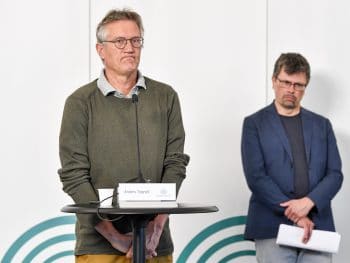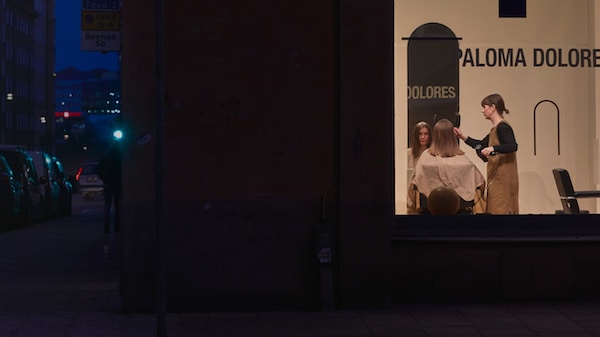From Djurgården, I walk along the water on Strandvägen–a rising fall whips in a determined wind across the water, slicing at remnants of summer and carving pathways around centuries-old buildings. Colors like Nordic interior design catalogs look like they’ve been stirred among clouds–a muted vibrance that evokes a calm and stoic resolve.
Albeit quieter than a typical early fall day, there’s a bustle. People are out and their faces are bare. Buses and trolleys roll by and not a mask can be seen inside. Scuffed and faded stickers on the street remind people to keep their distance yet they seem like relics from a time long gone when a global pandemic was something people needed to worry about. The only time I could feel the ghostly press of the pandemic was in the Old Town. Typically wall-to-cobbled-street-wall with tourists, it was surprisingly empty. A few crinkled and hand-scribbled signs in shop windows announced limited hours or closures–no opening date, just closed.
But like a fleeting eerie patch in a lucid dream, as soon as I wandered across the bridge to Söder, the Southern island of Stockholm, the bustle was back–and bigger. On Götgatan, the main thoroughfare that runs the length of the island, streets and sidewalks were thick with pedestrians. Bikes zipped to and fro, people sauntered, rushed and stopped to chat. Absolutely nothing was out of the ordinary. Restaurants were open, barbershops, clothing stores, and even pharmacies were welcoming unmasked patrons in. As I stepped tentatively into a shop I’d frequented many times–looking for a special Swedish soap–my flowery mask was greeted as if I had strapped a giant dildo to my forehead. By the register, a plexiglass shield sat uselessly as the woman ringing me up poked her head around it to speak to me. I couldn’t help but laugh. Into my mask.
Before this pandemic began, I had started writing an article about Sweden–about the shiny facade of democratic socialism that hides a decidedly capitalist reality shifting more and more towards the U.S. model on how to fuck people over more efficiently and for more profit. Still, when the pandemic hit, I was sure that Sweden would respond the way our neighbors did in Denmark and Norway. After all, for all their faults, Sweden believes in things like climate change. Sweden uplifts scientific research and surely, Sweden wouldn’t turn its back on clear cut epidemiological evidence. Right?
Ice in your belly
Enter Anders Tegnell, the controversial State Epidemiologist who has led Sweden’s COVID response–or lack thereof. As nations around the globe locked down, mandated face masks, and engaged in contact tracing and mass testing, Sweden implemented measures such as banning gatherings of more than 50 people, closing high schools and universities while keeping younger children in school (homeschooling is not allowed except in “extraordinary circumstances”). Shops stayed open as did most other businesses save big amusement parks, concert venues, and the like. As I was headed back to the states in early September, a neighbor’s high school kids were on a three-day rotation: two days in school for at most a half-day, and then one day of remote learning.
None of these moves were spontaneous or without measured consideration. Ask any Scandinavian–Swedes aren’t known for our carefree spontaneity. No, at the start of the pandemic, the plan was clear. Tegnell and friends said they’d be leaning heavily on “folkvett,” which basically translates to common sense. Of course, the problem with common sense during a pandemic is twofold. One, not everyone has it. Two, common sense doesn’t help address the failures or shortcomings of a government butt-scooting down the human decency curve on a neoliberal slip-n-slide. Still, like any neoliberal endeavor, this one comes pre-packaged with all kinds of slick excuses and explanations.
In a recent interview with the Financial Times, Tegnell notes that the goal from the beginning was “sustainability… to be resistant to quick fixes, to realize that this is not going to be easy… it’s not going to be fixed by one kind of measure.” The fallacy here of course is to conflate stricter measures with a quick fix and to ignore the fact that stricter measures on the front-end saves lives and allows for an easing of restrictions later on (just look at New Zealand and South Korea). But ignore this he does! Tegnell taps an old Swedish saying “is i magen” which translates literally to ice in your belly–the idea that you should remain calm and not panic in stressful situations. Here again, Tegnell falls into a false equivalency. Panic is not the same thing as a calm but quick and logical response. An EMT for instance has to act quickly, but should obviously not panic in the midst of stabilizing a patient for transport from the bloody scene of an accident.

Tegnell, Sweden’s COVID-19 guru, gives a daily update on the coronavirus situation in Stockholm, June 3, 2020. Anders Wiklund | TT via
Tegnell, however, is the EMT in the passenger seat smoking a cigarette. He trusts that things will work out fine and in Tegnell’s case, he feels that they largely have. Back in June, he conceded during an interview that “If we would encounter the same disease, with exactly what we know about it today, I think we would land midway between what Sweden did and what the rest of the world did.” Yet, come September he told the Financial Times that he’s actually not sure the response would have changed much. This comes after an incident in mid-August where he again drew international ire for saying that wearing masks could actually be “dangerous” as it gives the wearer a false sense of security. I couldn’t help but be reminded of Biden’s quip when asked if he feels bad about any of his policy choices: “I regret nothing.”
Sadly, Tegnell’s thinking is something you can hear echoing across the political spectrum in Sweden. From my more conservative friends to anarchists, people are saying that wearing masks just promotes carelessness as opposed to safety. There’s a surprising uniformity of support for the government’s COVID response. The nearly 6,000 deaths of predominantly seniors are astonishingly shrugged off by the center and right while those to the left point a singular finger at the privatization and diminished quality of elder care in the country.
A neoliberal wet dream
An article from April in the leftist media outlet The Proletarian notes that some 21 percent of Swedish elder care is privatized, compared to 10 percent in Norway. What this shakes out to in terms of quality of care is that private firms require lower levels of schooling, fewer employees overall, and a more rapidly revolving door of part-time and temp employees thanks to corporate attempts to side-step the benefits guaranteed to full-time, non-temp workers. This also means that the workers have less power in the workplace, and there have been more than a few cases of workers quietly showing up to work with symptoms simply because they want to keep their jobs and not give the boss cause to fire them. Sound familiar?
Indeed, Sweden’s elder care is a neoliberal wet dream in many ways and provided a ready petri dish for COVID. That being said, shitty elder care and a shitty COVID strategy are not mutually exclusive issues. For instance, back in April, the Guardian reported on the fact that workers in Swedish elder care facilities weren’t wearing masks or gloves. When questioned, workers said they were just following guidelines.
As of September 14, according to the Public Health Authority, 41 percent of all the COVID deaths have been among those aged 80-89 years old, and an astonishing 88 percent of all deaths have been among those aged 70 and over. That is both a failure of COVID policy and a failure of elder care policy. It’s reminiscent of the legend of the ättestup which tells that in Viking times, the elderly were supposedly thrown off of cliffs or jump of their own accord so as not to be a burden to their communities. While historians have debunked this legend, it would seem from recent events that Sweden is attempting a morbid modern-day re-enactment of this old legend.
To give some context to these numbers, with a population roughly that of North Carolina, Sweden has the fifth-highest mortality rate per capita in Europe–five times higher than Denmark, and ten times higher than Norway and Finland.

Former Scandinavian Airlines flight attendants learn basic skills on to assist in nursing homes and hospitals due to the coronavirus outbreak, in Stockholm, Wednesday, April 1, 2020. The airline announced in mid-March the temporary layoff of up to 10,000 employees, 90% of its workforce amid a drop in demand for international travel as governments clamped down on public events to contain the virus outbreak. With the help of a foundation, it is one of several airlines offering former staff the chance to work on the front line of the pandemic. (AP Photo/David Keyton)
Still, Tegnell seems undeterred. In a September interview with news outlet France24, he notes that “Of course something went wrong when 5,800 people died. That’s definitely not something we expected. Nothing we planned for, nothing we hoped for. So that’s definitely gone wrong. But that does not mean that the strategy itself has gone wrong.” One might be inclined to wonder what it would take for Tegnell to admit that a strategy is wrong.
One might even be inclined to ask what that strategy is. In that same interview, Tegnell denied ever suggesting that herd immunity was the goal of the Swedish strategy despite the fact that leaked emails from March of this year prove otherwise.
In the same email dump, Tegnell responds to his Finnish counterpart, Mika Salminen who expressed concern over Tegnell’s wish to keep schools open, pointing out that closing schools could stop the spread of COVID to vulnerable age groups by 10 percent. Tegnell’s response: “10% might be worth it?” Worth it how exactly? So you can eat at a restaurant? So third-year students can celebrate their final exams, as was suggested in another email to Tegnell? We may never know the answer to this question–or others–considering the fact that Tegnell deleted many emails that were requested by journalists in Sweden. Maybe he should get some tips from Hillary Clinton on private servers.
Cast off the cliff of capitalism
Ultimately, it doesn’t matter which of the many possible reasons Tegnell chose to sidestep scientifically-proven measures during a pandemic. What matters is that almost 6,000 people were cast off the cliff of capitalism unnecessarily. Indeed, if the hope was to shelter Sweden’s capital, that didn’t work out either. In an analysis of data by the Financial Times, Sweden’s economy is doing worse than the economies of both Finland and Norway, while again leading the way in COVID deaths for Scandinavia–by a long haul. Unfortunately, the global capitalist market doesn’t really care whether or not Sweden stayed open for business.
In the midst of all this death and economic downturn, Sweden’s politicians have tip-toed around truth and riffed on classic neoliberal double-speak. They uplift the idea of common sense while failing to use any of their own. They dare to quip about sustainability at a time when Sweden is seeking to expand their oil refineries. They take credit for avoiding a current surge in European cases when the fact is that their policy has cost lives, not saved them.
If anyone can be thanked for avoiding all out disaster, it is (some of) the Swedish people themselves. A recent analysis from researchers at Uppsala University in Sweden and the University of Virginia School of Medicine show that nearly a third of Swedish residents voluntarily self-isolated. Many people, particularly those in high-risk groups, ignored Tegnell and donned masks and face shields in order to go shopping, using creative hand signals to remind people to respect the time-honored Swedish tradition of social distancing. Some families, including high-risk households, even tried to keep kids at home when schools reopened this fall, precipitating either fines or harassment from social services. Experts and academics signed on to a letter demanding a “more responsible policy” at the start of the school year, citing ongoing research that shows children do spread the virus, even if they are asymptomatic themselves.

FILE – In this Wednesday, March 25, 2020 file photo people sit in a restaurant in Stockholm. Sweden is pursuing relatively liberal policies to fight the coronavirus pandemic, even though there has been a sharp spike in deaths. The prime minister has proposed a new emergency law that would allow the authorities to shut down public venues and transportation quickly if needed. But for now, it’s still common to see people swarming on the Stockholm waterfront, sipping cocktails, while children still have group soccer practice.(AP Photo/David Keyton, File)
And herein lies the crux of the whole shebang–a silver lining and indeed a silver thread that connects our struggles here in the U.S. with those in Sweden and across the globe: at best, the government does nothing, and more often than not they actively obstruct people’s ability to thrive or even survive. Sweden still enjoys many socialized institutions and is admittedly a far cry from this shitty city upon a hill–this most capitalist of all cut-throat capitalist goons that is the U.S. But they are headed this way. The siren call of neoliberalism can be heard in more places than just elder care centers. The rise of fascism there learns and adapts from the rise of fascism here.
And so we too must adapt. We must decouple our minds from the decrees of our politicians. Again, the striking support for Tegnell’s dumbshittery across the political spectrum in Sweden is very worrisome. We must indeed consider and fight for something sustainable–but that should not be (and in reality can not be) a sustainable capitalism. Indeed, what better current critique of capitalism is there than the fact that people must cheat death in order to financially survive? Or that our lowest paid workers are our most essential?
It is beyond infuriating, and unacceptable to think that (as I write this) 5,877 people have died from COVID in Sweden. But in the dark reality of government failures, we can see the light of actual common sense, of collectively using it. We can see laid bare the deeper cancers eating away at our present and our future. The French Revolutionary Maximillien Robespierre once wrote that “Louis must die so that France may live.” To repurpose that for our times: capitalism must die so that the world may live.

